QuestionHi, I'm Billy, 31 yr old, 6'1" 170 pounds...grown man on the verge of tears. I have a kitten that was born July 5th 2009. She appears to have a cold,or maybe a URI (going on 3 days), boogers coming out and drying up covering her nostrils. When i can i keep them moist and clear. Alot of wheezing or something like that when she's outta breath (i imagine cause she cant breath out of her nose) I checked the inside of her mouth and its pink like normal. No darkening. Her excrement is fine, kinda like dime size pebbles.
I'm currently on disability cause of a motorcycle accident, and don't have the money to get to a vet right away. What can i do to help her breathing, so she will at least eat and drink until i can get some money. I was thinking vicks and forcing some vitamin C crushed in water down her throat. Can you recommend or not recommended anything else..PLEASE.. I feel so bad for her. -Bill Henry-
AnswerHi Billy,
I'm going to do the best that I can to help you so you can exhale - together we'll find a solution that meets your kitten's needs without causing an already fragile budget to burst at the seams. The fact that this kitten is so young makes the upper respiratory infection more severe with higher incidences of serious complications, but I'm going to do whatever I can to help you and your baby out. If you send me the general location you're writing from (Canadian province or US state) I do keep a resource binder of organizations that can offer full or partial subsidy of emergency vet costs. The reason I ask for your location is because I don't want to waste your time or mine sending information that's of no use to you.
I don't recommend using Vicks on your kitty and human vitamin C preparations aren't all that easy on tiny tummies and you don't want to make her appetite any worse than it likely is at the moment since a cat of any age with a blocked nose isn't likely to eat well (if they can't smell it they generally won't eat it).
Some good ideas to help keep this kitten as healthy as possible include:
- Frequently cleaning the mucous and crusty discharge out of your kitten's nostrils. I recommend using a cotton ball or soft facecloth moistened with warm water to gently wipe away as much of the crusty discharge as possible. If your kitten is blowing bubbles out of her nose that's extremely serious, all you can do in this instance is keep her airway open on a temporary basis while you're getting her to a veterinarian for emergency medical treatment. (**bear in mind that most medical options people have also exist for pets these days, finances, your own sense of ethics will determine how far you can go)
- Baby your baby. What I mean by this is spoil her rotten and comply with any feline fussiness when it comes to what she's willing to eat. The second major issue besides keeping mucous cleared from your kitten's nostrils is making sure that she's eating enough to at the very least maintain her body weight, preferably at this age you want her to continue taking in enough food to keep her growing but sometimes sick kittens just won't eat very well. A cat of any age that doesn't eat is at risk of developing some potentially life threatening health problems (liver failure is a major one) so letting your kitten determine whether or not she's going to eat isn't really an option. Keep a close eye on food intake - if she's not eating much then you'll have to step in with what I like to call the feline favorite bribe foods which are as follows:
~ Canned fish: Any canned fish packed in water will work nicely for this purpose. I generally suggest trying tuna, salmon, sardines or mackeral. If you happen to have cocktail shrimp (canned or frozen) on hand you could also try that.
~ Baby food: Over the years I've found that meat based baby food can be a great appetite stimulant for sick cats. It's important to read the ingredient list well though because cats shouldn't have onions or garlic in any form because they can have adverse effects on a cat's health. I do recommend going organic whenever possible with baby food because the cheaper generics or conventionally processed baby foods just aren't as nutrient dense and in this situation you need a little to go a long way. Flavors like chicken, turkey, lamb, beef or veal are generally popular with cats. If you need information about the nutritional content of baby foods you may use to get nutrition into your kitten until she's eating well on her own I'd recommend checking out http://www.nutritionresource.com/foodcomp2.cfm?id=0300
~ Meat/poultry: You can give your kitten cooked chicken, turkey, beef or lamb if you aren't comfortable feeding raw meat. If you're okay with feeding raw meat then you'll want to cut muscle meat up in eraser sized (on the tip of a standard mechanical pencil) pieces and float it in a ziploc bag resting in hot tap water until the meat is roughly body temperature (cats don't like cold food, it's harder for their system to digest and they're designed to eat prey they've killed which wouldn't be cold)
~ Canned or ready made raw cat food: Since the Menu Foods pet food recalls of 2007 I'm much more reluctant to make specific brand recommendations, especially since my eldest cat nearly died as a direct result of eating a highly recommended so-called "premium" food routinely recommended by veterinarians across North America and beyond. Since that time I've spent a considerable amount of time, energy and resources researching pet food companies that produce their food on a commercial scale and I've found two commonly available brands that I feel safe recommending to pet parents. Wellness and Spot's Stew by Halo are made from human grade ingredients rather than the by-products of human food production. As far as I know Spot's Stew by Halo and Wellness have never been recalled for any reason at any time. I've found that these foods truly show some of the shortcomings of cheaper diets since you aren't blown over by the unpleasant stench (what is that smell anyway???) when you open a can, in fact the food in the can actually smells like what the label says is in the can which is a nice change from most. I have (and still do on occasion) fed my cats these brands, when it comes to Wellness my cats really like the chicken, turkey, chicken and lobster or turkey and salmon formulas.
There is also a canned prescription recovery formula of cat/dog food that's specifically designed to be very palatable. This food is meant to help get sick pets eating on their own. Along with being highly palatable (it smells pretty good when you open the can) there's more water in the food than in some canned foods so it helps to ensure that the kitty is getting enough fluid as well. The drawback is that this food is a prescription diet, this means that in some areas veterinary clinics will not sell it to you without a prescription. If you'd like to try this food I'd strongly suggest calling around to local vets, explaining your situation and asking if they'd sell you a can of MediCal Cat/Dog Recovery formula - the worst these folks can say is "No".
Since the Menu Foods recalls many companies have decided to create raw diets for pets in the hope of regaining the trust of their former customers. Not all raw diets are alike - cats are obligate carnivores, this means that their diet absolutely MUST be meat (not grain, vegetable or cereal) based diet. One company I'm aware of is Feline's Pride, these folks will ship throughout the US and Canada and the shipments are guaranteed to arrive mostly frozen provided that you are home when the shipment arrives and you get the food into the freezer immediately. If there is an issue with the shipment I've heard good things about this company's willingness to fix problems, but I've never dealt with them myself. This may be a good company to consider when your kitten recovers from her URI and you recover from your injuries so that you'll be able to spend as many good years as possible together. For further information about pet food and the unique nutritional needs of cats I would strongly suggest that you consider checking out the following websites: www.catinfo.org, www.catnutrition.org, www.felinespride.com, www.halopets.com/pet-education/pet-articles/pet_food_what_you_need_to_know.html.
~ OTC vitamin/calorie supplements: PetAg makes some products such as Energel which are specifically geared towards stimulating the appetites of sick or elderly cats and as an added bonus they provide some vitamins and minerals. I would advise against depending on these products to provide 100% of your kitten's nutrition at any point, but as an added supplement it's perfectly acceptable and most cats seem to enjoy these pastes.
~ Meal replacement formulas: Given the fact that your kitten is still quite young you could certainly invest in a can of powdered concentrated kitten milk replacer such as KMR, Mammalac or Just Born. In situations like this I often use KMR to thin out baby food or canned cat food if I have to resort to syringe feeding a sick cat or kitten. You can purchase pre-mixed cans of KMR and similar formulas, but they're substantially more expensive than the powdered versions. If you wanted you could try to make the KMR formula go a bit further by mixing the reconstituted powder with an equal quantity of the KMR weaning formula that has also been mixed with water and added to meat based baby food. If your kitten is willing to lap the formula on her own then I'd suggest adding meat baby food to create a mixture roughly the size of a protein shake to see if your girl will eat that way.
****HINT: Sick cats, especially those with upper respiratory infections won't generally eat their food if they can't smell it. Before committing to syringe feedings every 4 hours or so I'd recommend warming the food that you're offering by floating it in a ziploc baggie of hot tap water until it's roughly body temperature. Warm food has a stronger smell to it than food that's room temperature or fresh from the fridge.
It's not uncommon for kittens with upper respiratory infections to get quite sick very quickly and these infections are contagious which means that this baby needs to be isolated from other cats or kittens in your household. Any sick kitty needs some basic help to recover and since we've already dealt with the nutritional aspect of this situation I've taken the liberty of listing some basics to help you provide your kitten with the best possible environment to recover from her illness. Sick cats of any age:
- Should never be allowed to mingle with healthy pets. This is for a couple of reasons, first and foremost you don't want anyone else to get sick and the viruses that are commonly responsible for upper respiratory infections in cats are highly contagious to all cats, particularly if they haven't received their kitten vaccines and a booster a year after their kitten shots (after that vaccines are controversial and I can provide you with more information on this topic if you're interested in learning more since many vets are reluctant to change the way that they vaccinate).
- Proper hygienic precautions must be taken before handling your sick kitten to minimize the risk that you'll bring any other infections into her makeshift infirmary. Washing your hands thoroughly in hot, soapy water for at least 20 seconds before you handle your kitten and afterwards OR using an alcohol based hand sanitizer such as Purell is a crucial way to reduce the risk of spreading viral infections to other cats in your home and avoid potentially contracting a case of pink eye if your kitten has any crusty or mucousy discharge from her eyes.
- The kitten must be kept in a warm, quiet, dimly lit and private area. Keep activity to a minimum so that your baby girl can get the rest that she needs to recover. I would advise against allowing young children to handle your kitten at this time, she doesn't need any stress in addition to what's already happening.
- Your kitten may be more comfortable with a humidifier running, a cool mist one is more sanitary and safe for use around cats than a humidifier that produces steam to increase the humidity in the room. Cats have suffered burns by sticking curious noses too close to the output of a traditional humidifier and this baby doesn't need any additional stress, she's fighting a tough battle right now.
- Cats are generally connoiseurs of comfort anyhow, but when they're sick it's especially important to provide them with a soft, warm and comfortable place to sleep. When a cat is sick you can put a heating pad on the lowest setting and wrap it in a heavy towel to warm it before offering it to your kitten. I don't suggest using microwave heat packs unless you're using the microwaveable disk sold in pet stores specifically to keep orphaned, elderly or sick cats warm. I would also advise against leaving a heating pad plugged in for any length of time unattended because you don't want to risk accidental burns.
- Sick cats of any age need lots of TLC. Spend some time cuddling with your kitten, give her plenty of pets and talk to her in a soothing voice. I happen to believe that love is a very powerful addition to any sick cat's medical/nursing care and it will certainly help to reinforce the bond between kitten and caregiver.
It's not uncommon for sick cats to refuse food and/or liquids altogether and in this case I'd be surprised if your kitten is eating much based on your description of the whole situation. If you haven't syringe fed a cat before here are a few tips to help make things a bit easier and cause less stress for everyone involved:
~ You can attempt feeding your baby small amounts of food every couple of hours by syringe. An oral syringe like those sold in the baby section of pharmacies tend to work quite well, they're small, durable, relatively easy to clean and they don't tend to be as large as some syringes offered to pet parents in a veterinary hospital.
~ Your kitten may attempt to fight you and avoid being forced to eat, it's not uncommon and to be honest some cats will be very good about accepting their bruised pride, other cats will do everything in their power to prevent you from getting any food into their stomachs, instead they prefer to coat the human with the food.
~ If your kitten absolutely refuses to take anything (or takes very little) food from her syringe then it's perfectly acceptable and humane to towel wrap your kitten using a fairly thick medium sized towel. This process is somewhat like swaddling a baby fairly tightly (you do not want your kitten to get a paw free since things can get nasty if that happens) and since your kitten is already not feeling too hot you want to help reduce the stresses that she's exposed to and most cats really aren't fond of being forced to do anything even if it is for their own good.
~ As I mentioned above the food should be warm to the touch before attempting to force feed any cat. The most effective way that I've found to do this is to have the approximate amount of food your kitten needs at her feeding floating in a bowl of hot tap water, this helps to keep the food warm. My recommendation is to use ziploc baggies OR you can use the thinner disposable plastic containers - the kind meant to hold snacks is perfect for this purpose and it ensures that you won't have to wait for food to cool slightly.
In your kitten's case if you do end up needing to force feed her then I do have a few suggestions about how to mix her meals up so that she's getting the nutrition she needs, her meals come out of the syringe without too much hassle and the whole thing is relatively cost effective. The ingredients are as follows for any given batch of food (there should be 4-6 feedings each day, don't overfeed or you'll see the food again):
* 1 jar of meat/broth baby food (see flavors above)
You need to be able to meet your kitten's need for animal protein and this will do on a temporary basis. You can certainly
* 3-4 tablespoons of KMR, KMR Weaning formula or a 1/2, 1/2 mixture of the two
The addition of KMR newborn or weaning formulas allows for extra fat, protein, calories and vitamins which your kitten is in dire need of to help give her the energy she needs to get well soon. Kitten formulas generally don't keep for anymore than 24-48 hours when refrigerated. The easiest way to increase their shelf life is to pour the mixed formula into ice cube trays, put them in the freezer and store the KMR cubes for up to 6 months in the freezer. You can certainly use the leftover formula in your freezer as kitten treats after she gets healthy again.
* 1-2 tablespoons of plain, unsweetened, organic yogurt
Most cats are lactose intolerant after weaning, however yogurt doesn't generally fall into the category of regular dairy products. Yogurt provides some extra calcium which is important since your kitten is growing quickly and they need to have calcium in order to have strong bones. Aside from the calcium in the yogurt there are beneficial bacteria normally found in the digestive tract of healthy pets and people, if your kitten does require antibiotics to prevent or treat a secondary infection caused by the URI giving the yogurt will be a head start in terms of minimizing the risk that your kitten will develop diarrea (quite common with antibiotics since they don't differentiate between good bacteria and bad bacteria, they kill them all off)
* 2 teaspoons of organic vegetable based baby food such as carrots, squash OR sweet potatoes
A small amount of one of these veggies in baby food form allows the kitten to get some extra vitamin C without using a specific supplement, however if you'd prefer to go with an actual supplement I'd suggest asking a vet to recommend a reputable company that produces high quality, bio-available kitty vitamins.
* 1 raw egg yolk
The egg yolk helps to provide some extra protein which allows your baby to continue receiving the nutrients she needs to beat this infection. It's very important that you NEVER feed a cat raw egg whites, it can make them sick and this kitten's already got plenty happening without putting fertilizer on it. If you want to use the egg whites you'll need to cook them lightly then puree them with the rest of the ingredients.
* 1 inch or so of Energel, Nutrical or another similar product
These products often help to stimulate appetite and they generally contain vitamins, minerals and extra calories that a sick kitty needs.
Hopefully this information has helped to get things moving in the right direction for this kitten. I do certainly recommend that this kitten sees a veterinarian ASAP and I do think she'd qualify for a special program run by the AVMA which dispenses funds to cover the cost of emergency veterinary care for kitties with life threatening medical issues, once you've sent your location my way I'll check to see that it's available in your area. In the meantime you and your kitten are in my thoughts. At this point all that you can provide is supportive care, in this situation it means that your kitten's nasal discharge needs to be cleaned from in and around her nostrils as often as possible (letting it build could contribute to a serious secondary infection and a plugged nose could cause issues with her breathing), you have to see to it that your kitten's getting enough food and water to meet her needs and it's crucial for you to monitor the kitten's output of urine/feces on a daily basis because the vet will want to know about any changes beyond the obvious ones. The sooner I hear back from you the sooner that I can send you information that just might help get this baby girl the medical care that she needs promptly. I can also provide you with some ideas that might help when it comes to the cost of your kitten's medical care. If you have any further questions, concerns or you'd like me to clarify anything in this answer, please feel free to contact me again and I'll be happy to help you out to the best of my ability.

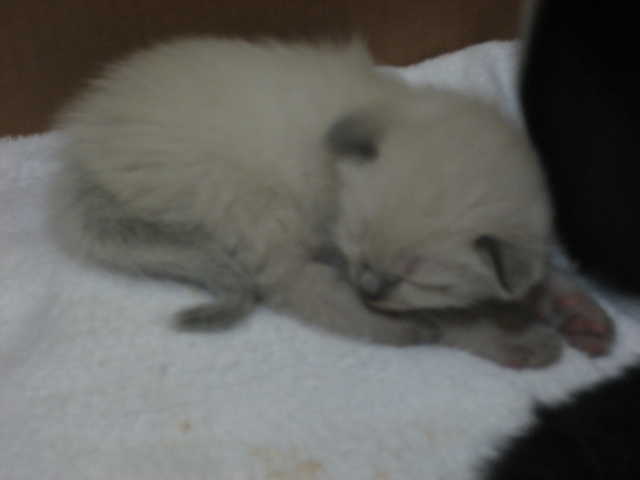 is my kitten a blue point?
QuestionPolar bear
QUESTION: hi, our black and w
is my kitten a blue point?
QuestionPolar bear
QUESTION: hi, our black and w
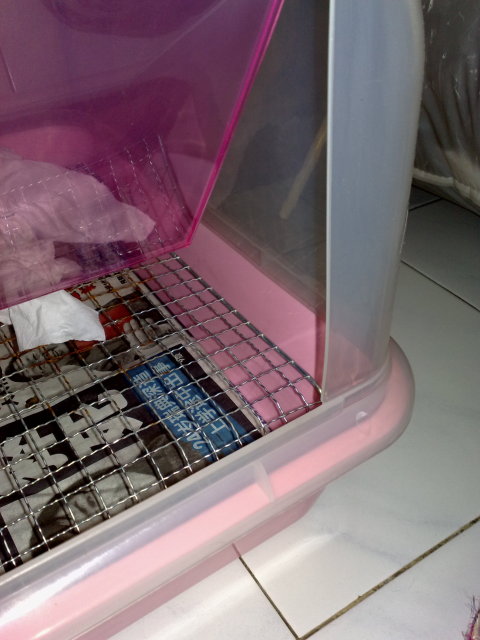 My cat doesnt piss on his litter box
QuestionLitter box
QUESTION: My 7months stray ca
My cat doesnt piss on his litter box
QuestionLitter box
QUESTION: My 7months stray ca
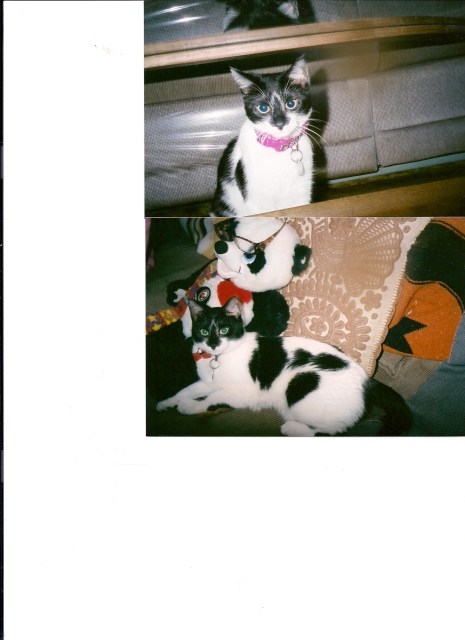 Kate
Question
CREAM PUFF
Hello !
About 2 years ago I
Kate
Question
CREAM PUFF
Hello !
About 2 years ago I
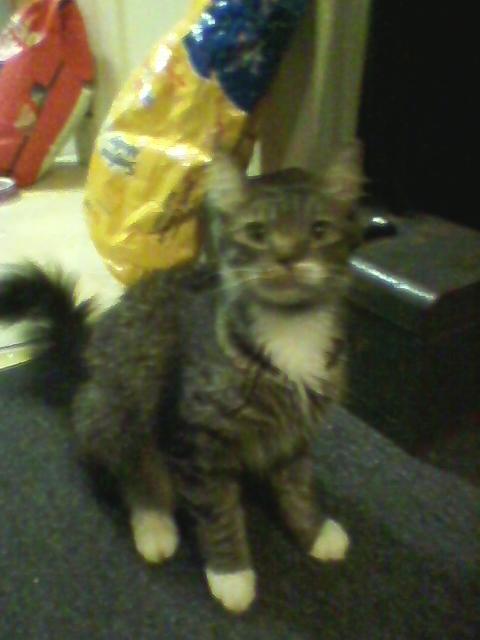 cat identification
Question
pic was from my phone,
i am currently f
cat identification
Question
pic was from my phone,
i am currently f
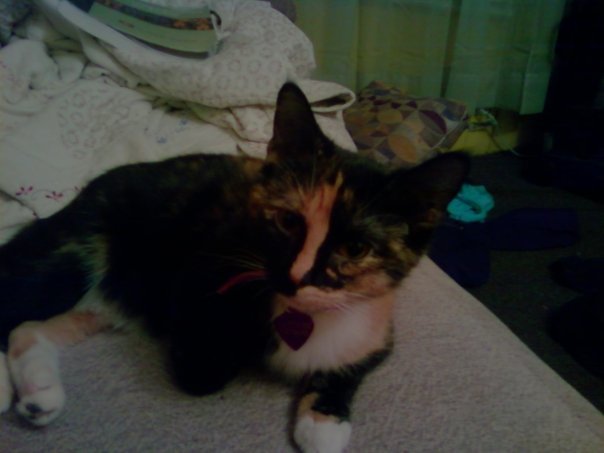 Female Cat changes behavior
Question
Patches
I have four older cats, a dog and now
Female Cat changes behavior
Question
Patches
I have four older cats, a dog and now